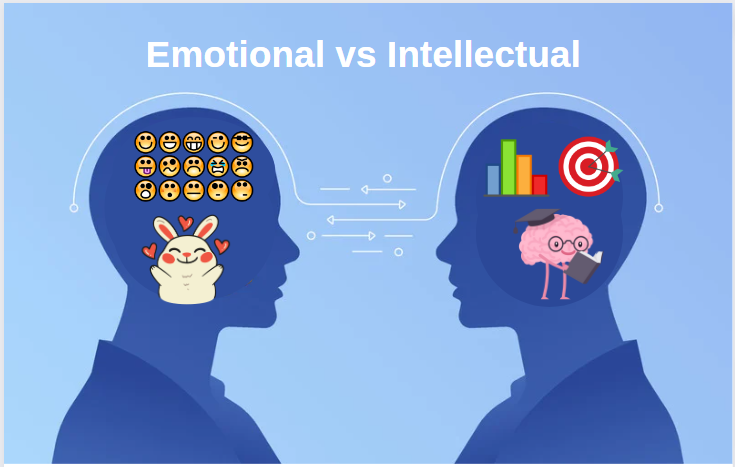
Duality – Intellectual vs Emotional explores the contrasting aspects of rationality and logic (intellectual) versus feelings and emotions (emotional). It represents the dichotomy between relying on rationality and analytical thinking versus being guided by emotions and subjective experiences. Let’s delve into each aspect in detail:
Intellectual:
The intellectual aspect pertains to the realm of reason, logic, and analytical thinking. It involves the use of cognitive abilities, knowledge, and critical thinking to understand and interpret the world. Intellectual pursuits are often associated with objectivity, analysis, and problem-solving. Intellectual decisions are based on evidence, facts, and logical reasoning rather than personal feelings or biases.
Intellectual thinking encourages questioning, seeking knowledge, and making decisions based on careful evaluation of available information. It relies on cognitive processes such as analysis, deduction, and evaluation. Intellectual pursuits are often valued in academic and professional settings, where objective analysis and logical reasoning are essential.
Emotional:
The emotional aspect refers to the realm of feelings, emotions, and subjective experiences. It encompasses the expression and recognition of emotions, empathy, and personal connections. Emotions are an inherent part of human nature and play a vital role in shaping our perceptions, motivations, and behaviors.
Emotional decisions and experiences are driven by feelings such as love, happiness, sadness, anger, and fear. Emotions can be influenced by personal experiences, cultural background, and individual beliefs. They guide our responses to situations, interactions with others, and the formation of personal bonds.
Understanding the Duality:
The duality between intellectual and emotional aspects arises from the inherent tension between reason and emotion. Intellectual thinking aims to be objective, logical, and based on evidence, while emotional responses are subjective, personal, and influenced by individual experiences and biases.
While intellectual thinking provides a rational framework for decision-making and problem-solving, it may overlook or undervalue the role of emotions in shaping perceptions and experiences. Emotions can provide important insights, motivate actions, and contribute to personal growth and well-being.
Balancing Intellectual and Emotional Aspects:
Achieving a balance between intellectual and emotional aspects is crucial for a holistic and well-rounded approach to life. Both aspects have their strengths and limitations, and an overemphasis on one over the other can lead to an imbalance.
Intellectual thinking can benefit from acknowledging and incorporating emotional intelligence. Recognizing and understanding emotions, both in oneself and others, can enhance empathy, communication, and interpersonal relationships. It can also provide valuable insights into personal values, motivations, and aspirations.
Similarly, emotional experiences can benefit from the integration of intellectual thinking. Evaluating situations objectively, considering multiple perspectives, and analyzing the consequences of actions can lead to more informed and balanced emotional responses. Intellectual thinking can help manage and regulate emotions effectively, leading to better decision-making and overall well-being.
Conclusion:
The duality between intellectual and emotional aspects reflects the contrasting nature of rationality and logic versus feelings and emotions. Balancing these aspects involves acknowledging and integrating both intellectual thinking and emotional experiences. Embracing intellectual thinking allows for objective analysis and logical decision-making, while recognizing and understanding emotions leads to empathy, self-awareness, and personal growth. By finding a harmonious balance between intellectual and emotional aspects, individuals can develop a more comprehensive understanding of themselves and the world around them.

